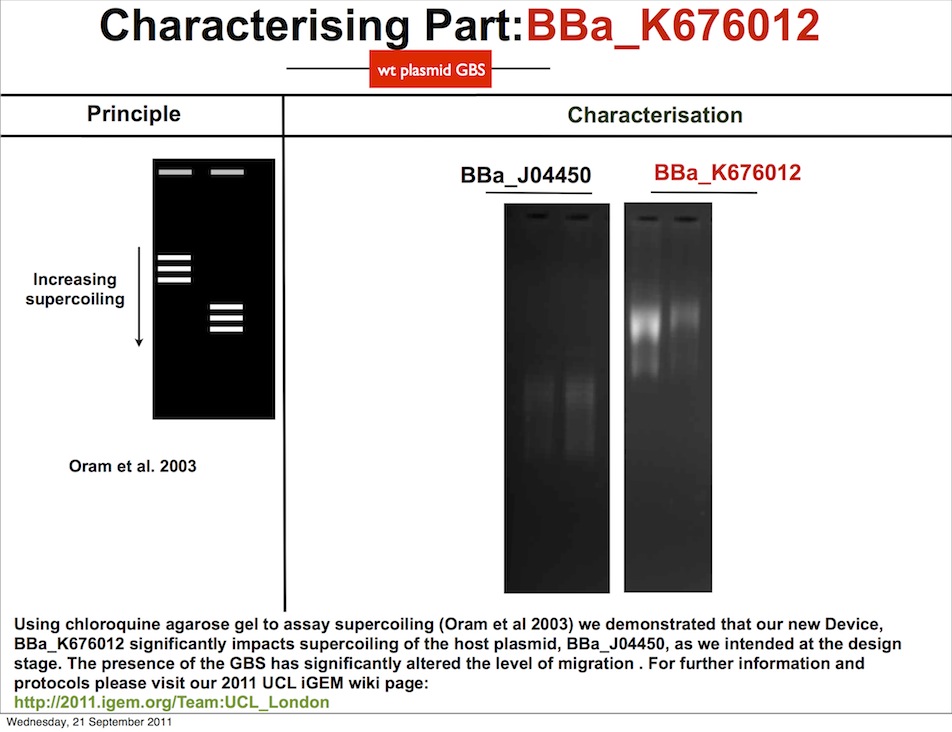Difference between revisions of "Part:BBa K676012"
| (3 intermediate revisions by 2 users not shown) | |||
| Line 1: | Line 1: | ||
| − | |||
__NOTOC__ | __NOTOC__ | ||
<partinfo>BBa_K676012 short</partinfo> | <partinfo>BBa_K676012 short</partinfo> | ||
| − | The gyrase site cloned from pBR322 plasmid. | + | The gyrase binding site cloned from pBR322 plasmid. |
| − | |||
===Usage and Biology=== | ===Usage and Biology=== | ||
| + | |||
| + | In the in vitro pBR322 plasmid GBS study, experts identified that the preferred cleavage site for gyrase have the following consensus DNA sequence: 5’-GGCTGGATGGCCTTCCCCAT-3’. Throughout this study, researchers also found out that the cleavage occurs specifically between the TG residues (990th nucleotide in the pBR322 plasmid) in the DNA sequence [1]. By multiple sequence alignments and mathematical predictions, they predicted the presence of around 45 to 50 major gyrase binding sites in the entire E. coli genome. These predicted sites were later seen to play an important role in compacting the bacterial chromosomal nucleoid as well as regulating the transcription and DNA replication. However, apart from these major binding sites, there are still roughly 10,000 more of the weak binding sites, which gyrase will not normally associate unless they are present in a high enough concentration. | ||
| + | |||
| + | [[Image:Characterising_Part_BBa_K676012.jpg]] | ||
<!-- --> | <!-- --> | ||
Latest revision as of 02:22, 10 October 2011
Gyrase Binding Site from pBR322
The gyrase binding site cloned from pBR322 plasmid.
Usage and Biology
In the in vitro pBR322 plasmid GBS study, experts identified that the preferred cleavage site for gyrase have the following consensus DNA sequence: 5’-GGCTGGATGGCCTTCCCCAT-3’. Throughout this study, researchers also found out that the cleavage occurs specifically between the TG residues (990th nucleotide in the pBR322 plasmid) in the DNA sequence [1]. By multiple sequence alignments and mathematical predictions, they predicted the presence of around 45 to 50 major gyrase binding sites in the entire E. coli genome. These predicted sites were later seen to play an important role in compacting the bacterial chromosomal nucleoid as well as regulating the transcription and DNA replication. However, apart from these major binding sites, there are still roughly 10,000 more of the weak binding sites, which gyrase will not normally associate unless they are present in a high enough concentration.
Sequence and Features
- 10COMPATIBLE WITH RFC[10]
- 12COMPATIBLE WITH RFC[12]
- 21COMPATIBLE WITH RFC[21]
- 23COMPATIBLE WITH RFC[23]
- 25INCOMPATIBLE WITH RFC[25]Illegal NgoMIV site found at 149
- 1000COMPATIBLE WITH RFC[1000]

